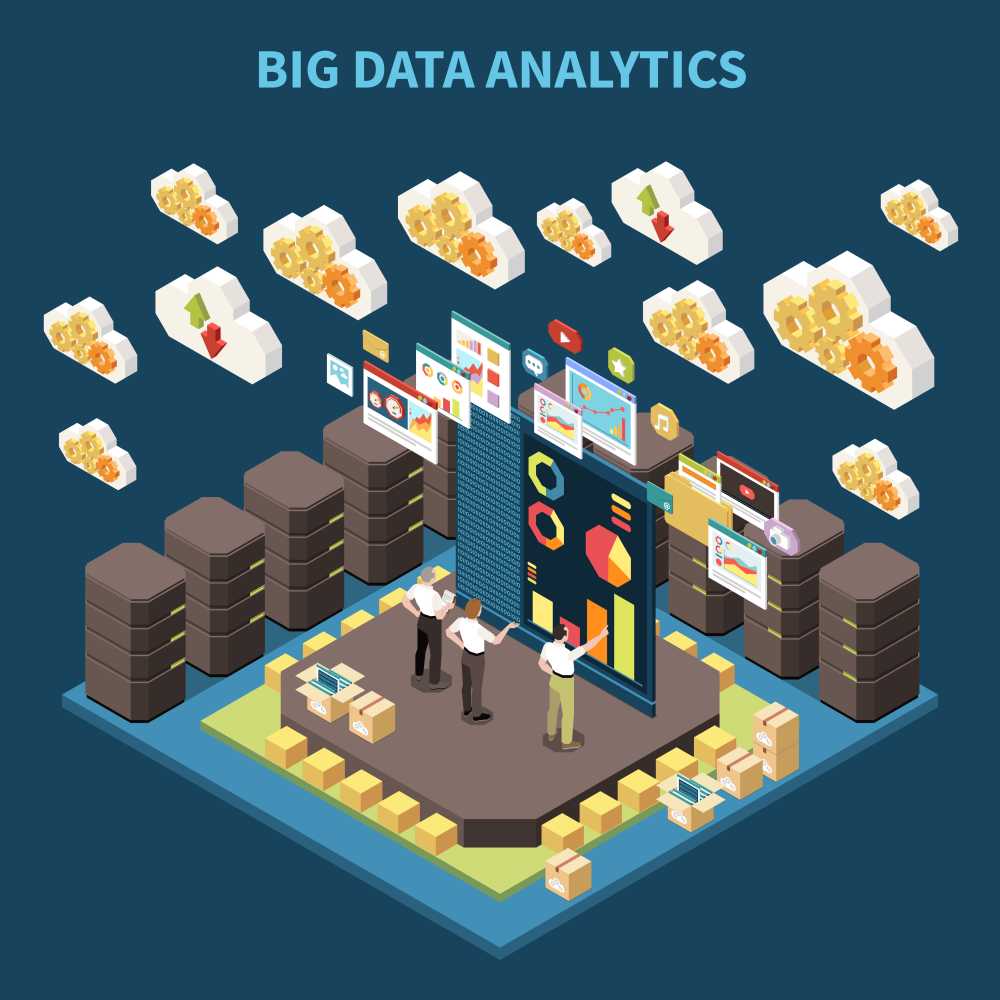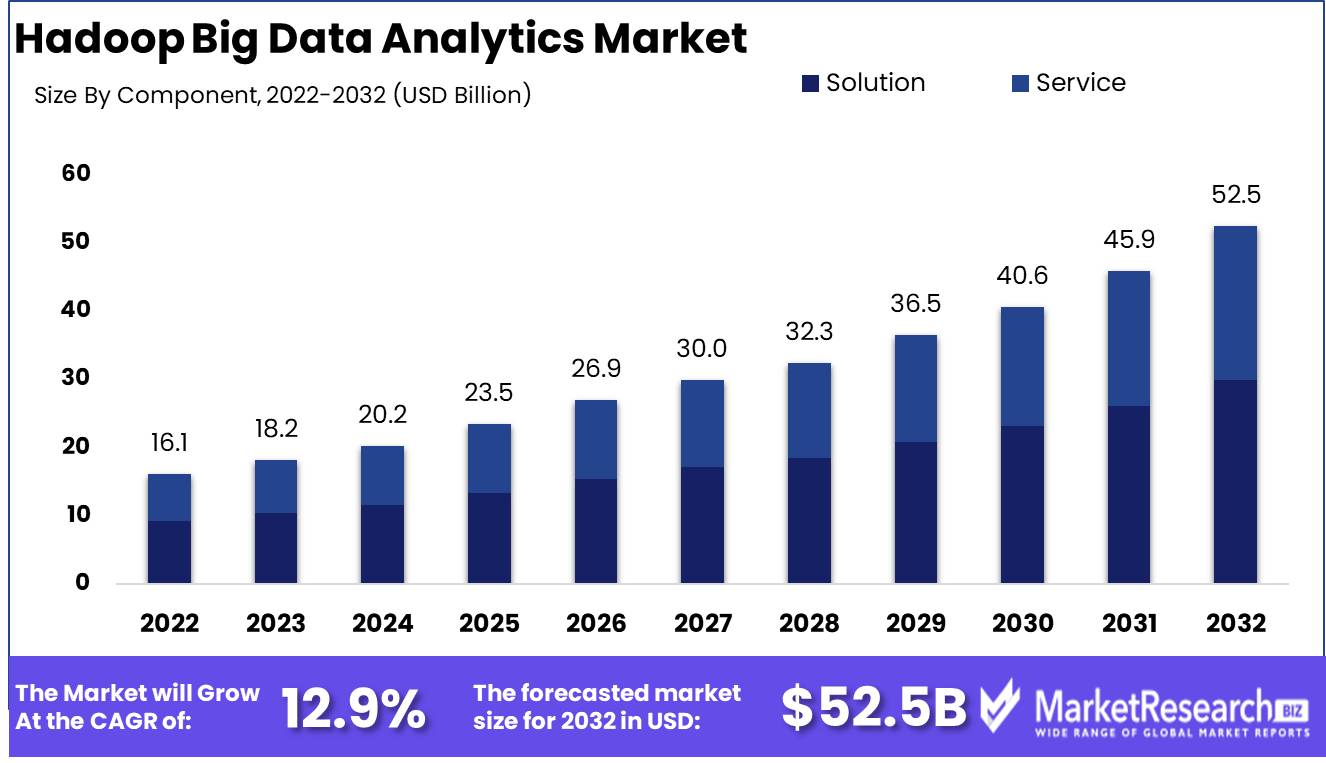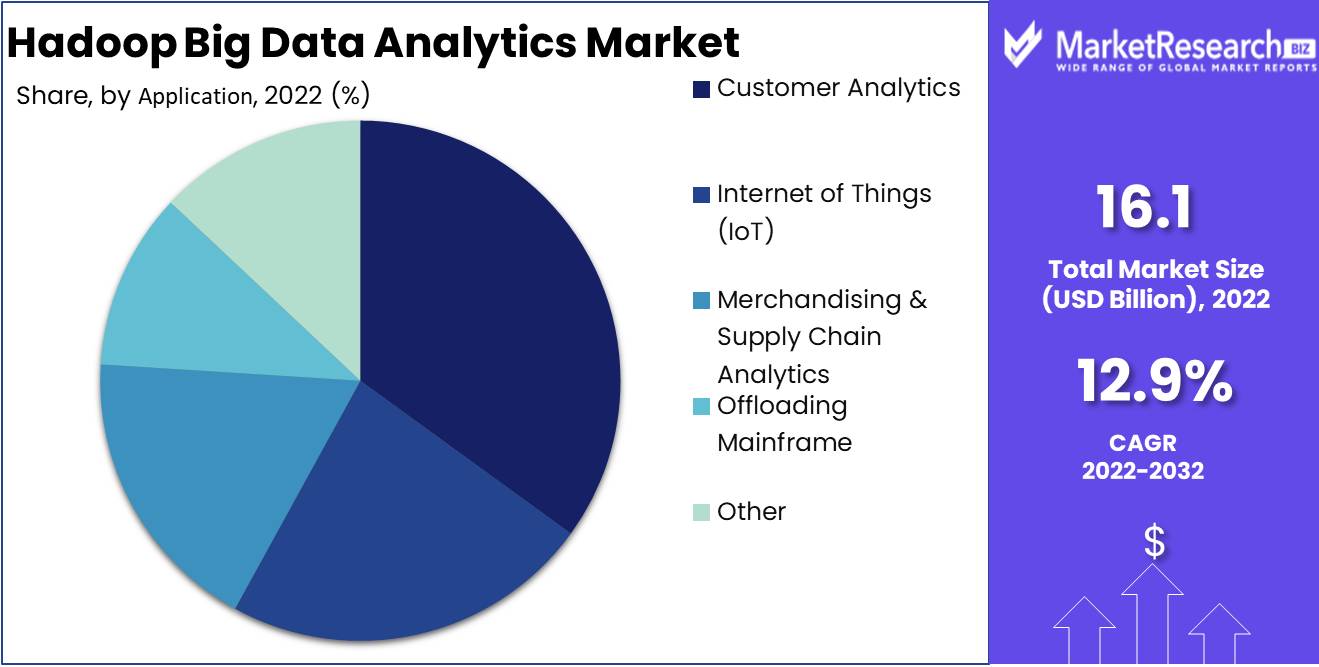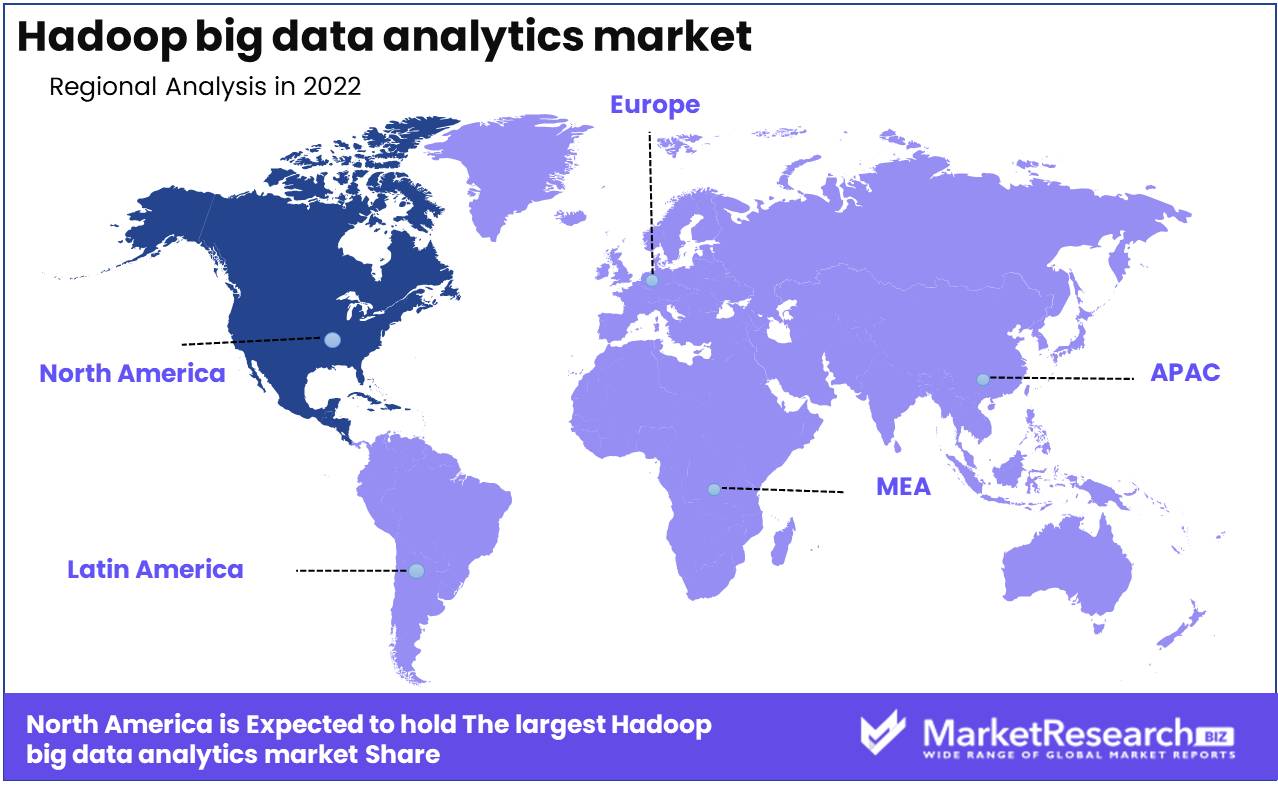
Hadoop Big Data Analytics Market By Component(Solutions, Services),By Application(Customer Analytics, Internet of Things (IoT), Other),By Deployment Mode(Cloud Based, On-Premise), By Region And Companies - Industry Segment Outlook, Market Assessment, Competition Scenario, Trends, And Forecast 2023-2032
-
11940
-
Jul 2023
-
157
-
-
This report was compiled by Vishwa Gaul Vishwa is an experienced market research and consulting professional with over 8 years of expertise in the ICT industry, contributing to over 700 reports across telecommunications, software, hardware, and digital solutions. Correspondence Team Lead- ICT Linkedin | Detailed Market research Methodology Our methodology involves a mix of primary research, including interviews with leading mental health experts, and secondary research from reputable medical journals and databases. View Detailed Methodology Page
-
Quick Navigation
Report Overview
Hadoop Big Data Analytics Market size is expected to be worth around USD 52.5 Bn by 2032 from USD 16.1 Bn in 2022, growing at a CAGR of 12.9% during the forecast period from 2023 to 2032.
The Hadoop big data analytics market, which encompasses the use of the Hadoop framework to examine enormous and multifaceted datasets, embarks on an arduous voyage to untangle the intricate web of data. Its primary objective is to extract valuable insights and discernible trends from both structured and unstructured data, thereby paving the way for intelligent business decisions.

Businesses are turning to the realm of big data analytics in an attempt to capture the elusive competitive advantage in the face of a staggering increase in data generation.
The pervasive significance of the Hadoop big data analytics market exceeds the realm of mere hyperbole. It grants organizations the ability to harness the vast potential of data, empowering them to refine decision-making processes, enhance operational efficiency, discover novel revenue streams, optimize marketing campaigns, and nurture innovation.
The synergy between big data analytics and businesses fosters an in-depth understanding of consumer behavior, market dynamics, and the fluidity of industry trends, resulting in an indispensable competitive advantage.
The Hadoop big data analytics market is teeming with innovative manifestations, none more so than the incorporation of machine learning algorithms. Machine learning, which is exemplified by computer systems that acquire knowledge and improve performance through experience without explicit programming, endows big data analytics with unparalleled prowess. Organizations can strengthen their predictive capabilities and improve the accuracy of their forecasts by incorporating machine learning power into the analytical process.
The Hadoop big data analytics market thrives amidst a dynamic ecosystem of new products and services that are utilized to exploit the vast potential of big data analytics, as evidenced by substantial investments from both established technology titans and daring startups. The likes of IBM, Microsoft, Google, Oracle, and Amazon Web Services have seamlessly incorporated big data analytics into their cloud-based offerings, providing businesses with effortless access to and analysis of vast datasets while eliminating the need for costly infrastructure investments.
Driving factors
Increasing Data Volume and Complexity
Today, the world generates an enormous quantity of data. From social media interactions to online purchases, each click, like, and purchase expands the digital universe. This enormous amount of data is accompanied by a growing degree of complexity. Traditional data processing systems struggle to manage such voluminous quantities of data and frequently fail to extract valuable insights from it.
The Hadoop big data analytics market arises as a response to the challenges posed by the growing volume and complexity of data in this context. In a distributed computing environment, Hadoop, an open-source framework, enables businesses to process and analyze large datasets. Its ability to horizontally scale across numerous servers enables organizations to efficiently manage massive data sets.
Industry Expansion in Big Data and Analytics
The rise of the Hadoop big data analytics market has been fueled by the exponential growth of the big data and analytics industries. Organizations in diverse industries recognize the potential of data-driven insights for obtaining a competitive advantage. As a consequence, the demand for advanced analytics platforms and tools has skyrocketed.
The Hadoop big data analytics market offers businesses an all-encompassing solution for harnessing the potential of big data. Its distributed computing architecture enables parallel processing, allowing for rapid analysis of enormous quantities of data. In addition, Hadoop's open-source nature allows for cost-effective implementation and customization, making it an attractive option for organizations of all sizes.
Innovative Distributed Computing and Open-source Technologies
The advancements in distributed computing and open-source technologies have substantially contributed to the expansion and growth of the Hadoop big data analytics market. Historically, data processing and analytics were carried out with costly proprietary systems, limiting their accessibility and scalability.
Hadoop, an open-source framework, revolutionized the field of big data analytics upon its introduction. It enables organizations to utilize distributed computing architecture for the processing and analysis of vast data sets. With Hadoop, businesses no longer require expensive hardware or software licenses for data analysis, making it a cost-effective option.
Restraining Factors
Data Integration and Quality Problems
Big data analytics must take into account data integration and quality. However, they can also serve as significant barriers for organizations seeking to implement Hadoop in the big data analytics market. Effective data integration requires integrating structured and unstructured data from multiple sources. Integration of diverse data sets can be difficult and time-consuming. This difficulty stems from the various data formats, structures, and semantics.
Organizations can surmount these challenges by utilizing data integration platforms that support seamless connectivity between various data sources. These platforms provide instruments for transforming, cleansing, and harmonizing data to ensure its readiness for analysis. Companies can optimize the potential of their big data analytics initiatives by implementing these solutions, which will expedite their data integration processes.
Lack of Competence in Big Data Analytics
As the demand for big data analytics continues to rise, a potential skills gap in this field emerges as a major constraining factor. To maximize the benefits of Hadoop in the big data analytics market, organizations need professionals with the requisite skills to manage large-scale data processing and analysis.
Data scientists play a vital role in deriving meaningful insights from immense quantities of data. They have a unique combination of abilities, including statistical analysis, machine learning, and domain knowledge. The dearth of qualified data scientists, however, poses a challenge for organizations seeking to adopt big data analytics.
Security and Privacy Concerns
Collecting and analyzing vast quantities of data raises privacy concerns, especially when it comes to personally identifiable information. Data breaches and unauthorized access pose a significant threat, potentially divulging sensitive data to malicious actors. It is essential to implement robust data protection measures, such as encryption and access controls, to protect sensitive data. Compliance with privacy regulations and frameworks, such as the General Data Protection Regulation (GDPR), inspires consumer confidence and ensures compliance.
Component Analysis
The Hadoop big data analytics market is dominated by the Solutions Segment. This segment consists of software solutions that allow organizations to process and analyze vast quantities of data. These solutions are indispensable for businesses seeking to obtain insights and make data-driven decisions. The Solutions Segment's dominance can be attributed to the rising demand for sophisticated analytics tools and techniques.
Economic growth in emerging economies drives the adoption of Hadoop big data analytics solutions. These economies are experiencing rapid expansion and are becoming significant global market players. As these economies expand, there is a greater need for businesses to effectively analyze and use their data.
Application Analysis
The Customer Analytics Segment dominates the Hadoop big data analytics market. This section focuses on analyzing customer data to obtain an understanding of their preferences, behaviors, and requirements. Understanding consumers is crucial for businesses to develop targeted marketing strategies, increase customer satisfaction, and fuel business expansion.
Similar to the Solutions Segment, the adoption of Customer Analytics solutions is driven by economic growth in emerging economies. As these economies expand, businesses must gain a deeper understanding of their customers to satisfy their changing demands. The Customer Analytics Segment offers the means to analyze customer data and derive actionable insights.

Deployment Mode Analysis
The Cloud-Based Segment dominates the Hadoop big data analytics marketplace. Scalability, cost-effectiveness, and simplicity of implementation are just a few of the benefits of cloud-based solutions over on-premises ones. These advantages have propelled the market adoption of cloud-based solutions.
The economic growth of emergent economies is also a significant factor in the adoption of cloud-based solutions. These economies are experiencing rapid expansion, and businesses are seeking agile and adaptable expansion solutions. Cloud-based solutions provide the scalability and adaptability required to meet the expanding needs of businesses in emerging economies.
In addition to consumer trends and behavior, the Cloud-Based Segment's market dominance is also influenced by other significant factors. For their personal and professional requirements, consumers increasingly rely on cloud-based services.
Key Market Segments
By Component
- Solutions
- Services
By Application
- Customer Analytics
- Internet of Things (IoT)
- Merchandising & Supply Chain Analytics
- Offloading Mainframe
- Other
By Deployment Mode
- Cloud-Based
- On-Premise
By End-Use Industry
- BFSI
- Energy & Utility
- IT & Telecommunication
- Media & Entertainment
- Retail & Consumer Goods
- Other
Growth Opportunity
Harnessing the Power of Artificial Intelligence
As the world descends deeper into artificial intelligence (AI), integrating AI capabilities into Hadoop analytics platforms presents a significant growth opportunity. Utilizing the power of AI algorithms and machine learning techniques can significantly improve the precision and productivity of data analytics processes.
By integrating AI into Hadoop analytics, organizations can unearth hidden patterns, identify anomalies, and obtain valuable insights from vast amounts of unstructured data. This convergence of AI and Hadoop has the potential to revolutionize industries such as healthcare, finance, and marketing, thereby accelerating market growth.
Internet of Things (IoT) Analytics in the Scope
Exploring the application of Hadoop big data analytics to the vast domain of the Internet of Things (IoT) represents an additional growth opportunity. With the increasing adoption of Internet of Things (IoT) devices, which generate enormous amounts of data, the need for advanced analytics solutions to extract actionable insights becomes critical.
By integrating Hadoop analytics with IoT platforms, organizations can optimize operations, improve customer experiences, and make data-driven decisions by leveraging the power of real-time analytics and predictive modeling. In industries such as manufacturing, transportation, and energy, the convergence of Hadoop and IoT analytics can unleash a vast array of growth opportunities.
Utilizing Blockchain Analytics in a Hadoop Setting
Blockchain, the technology that underpins cryptocurrencies such as Bitcoin, has expanded beyond digital currencies. Blockchain technology is being used in a variety of industries, such as healthcare, supply chain management, and finance, due to its inherent immutability and transparency.
Combining the power of Hadoop big data analytics with blockchain analytics can provide organizations with unmatched transactional data insights and secure data sharing. This creates fresh opportunities for fraud detection, identity management, and supply chain optimization. By implementing blockchain analytics in a Hadoop environment, businesses can obtain a competitive advantage in a market that is rapidly evolving.
Latest Trends
Expansion Of Data Lakes And Data Warehousing Based On Hadoop
The exponential development of Hadoop-based data lakes and data warehousing solutions is one of the leading market trends in the Hadoop big data analytics industry. Massive amounts of structured and unstructured data are being stored, processed, and analyzed by enterprises on these platforms. Hadoop's scalability, adaptability, and affordability make it an attractive option for organizations seeking to unlock the full potential of their data assets.
Hadoop-based data lakes facilitate enhanced data integration, allowing businesses to obtain valuable cross-domain insights, due to their capacity to manage diverse data types from multiple sources.
Demand for Analytics powered by Machine Learning and Artificial Intelligence
Increasing demand for machine learning and AI-powered analytics on the Hadoop platform is a further significant trend in the Hadoop big data analytics market. Large-scale datasets are being analyzed using machine learning algorithms and AI techniques to unearth latent patterns, identify anomalies, and generate predictive models.
By leveraging advanced analytics capabilities on Hadoop, organizations can extract actionable insights from their data, allowing them to promote innovation, improve operational efficiency, and enhance overall business performance. From fraud detection to customer segmentation to predictive maintenance, machine learning, and AI-powered analytics are revolutionizing all industries, from fraud detection to customer segmentation to predictive maintenance.
Use of Real-time Streaming and Internet of Things Analytics
Real-time streaming analytics and Internet of Things (IoT) analytics are also altering the landscape of Hadoop big data analytics. With the proliferation of Internet of Things (IoT) devices and the increasing number of connected sensors that capture real-time data, organizations can leverage Hadoop's capabilities to process and analyze this data at scale.
Streaming analytics in real-time enables businesses to extract immediate insights from streaming data sources, facilitating instantaneous decision-making and rapid response to changing business conditions. Whether it's monitoring user behavior, predicting equipment failures, or optimizing logistics, real-time streaming analytics on Hadoop provides organizations with unparalleled opportunities to gain a competitive advantage in today's fast-paced digital environment.
Regional Analysis
North America Region Dominates the Hadoop big data analytics market
North America continues to dominate the Hadoop big data analytics market, solidifying its position as a key participant in the global data analytics industry. In response to the rising demand for sophisticated data analysis tools and platforms, organizations are turning to Hadoop to extract valuable insights from their massive data sets. This article investigates the reasons for North America's dominance in the Hadoop market and identifies the main contributors to its success.
In recent years, the Hadoop big data analytics market has expanded swiftly, allowing businesses to manage and analyze large volumes of data more effectively. North America, which consists of the United States and Canada, has emerged as the market leader due to its numerous advantages. Let us investigate the causes of this dominance.
North America possesses a robust infrastructure and a sophisticated technological environment that facilitates the implementation and use of Hadoop. Significant investments have been made in the construction of data centers, high-performance computing systems, and cloud infrastructure in this region, facilitating the integration of Hadoop into existing IT environments. This technological prowess equips organizations with the tools and resources necessary to harness Hadoop's maximum potential and extract valuable insights from their data.
North America has established itself as a dominant force in the Hadoop market due in large part to the region's concentration of market leaders and industry titans. Amazon Web Services, Microsoft, and Google have made substantial investments in Hadoop technologies and continue to develop innovative solutions to meet rising demand. North America is a magnet for Hadoop-related investments and collaborations due to its commitment to research and development and its financial resources.

Key Regions and Countries
North America
- US
- Canada
- Mexico
Western Europe
- Germany
- France
- The UK
- Spain
- Italy
- Portugal
- Ireland
- Austria
- Switzerland
- Benelux
- Nordic
- Rest of Western Europe
Eastern Europe
- Russia
- Poland
- The Czech Republic
- Greece
- Rest of Eastern Europe
APAC
- China
- Japan
- South Korea
- India
- Australia & New Zealand
- Indonesia
- Malaysia
- Philippines
- Singapore
- Thailand
- Vietnam
- Rest of APAC
Latin America
- Brazil
- Colombia
- Chile
- Argentina
- Costa Rica
- Rest of Latin America
Middle East & Africa
- Algeria
- Egypt
- Israel
- Kuwait
- Nigeria
- Saudi Arabia
- South Africa
- Turkey
- United Arab Emirates
- Rest of MEA
Cisco Systems Inc. is a prominent player in the Hadoop big data analytics market, offering a comprehensive range of solutions and services. They provide cutting-edge networking technologies, storage solutions, and advanced analytics capabilities, enabling businesses to derive valuable insights from their data assets. Cisco's Hadoop infrastructure solutions are designed to optimize performance, scalability, and security, ensuring that organizations can effectively tackle the challenges associated with big data analytics.
SAP, a global leader in enterprise software, has made significant strides in the Hadoop big data analytics market. With its comprehensive suite of analytics solutions, SAP empowers businesses to turn massive volumes of data into actionable insights. Their Hadoop-based solutions deliver real-time analytics, predictive capabilities, and data visualization tools, enabling businesses to make informed decisions and gain a competitive edge in the market.
As a trusted and widely adopted cloud computing provider, Amazon Web Services Inc. (AWS) offers a range of Hadoop-based analytics services. AWS's Elastic MapReduce (EMR) platform allows businesses to process and analyze vast amounts of data using Apache Hadoop and other distributed data processing frameworks. With AWS EMR, organizations can leverage the power of Hadoop without the need for upfront infrastructure investment, making it a cost-effective and scalable solution for big data analytics requirements.
Hitachi Ltd, a Japanese multinational conglomerate, has emerged as a key player in the Hadoop big data analytics market. They offer a comprehensive suite of Hadoop-based solutions, including storage systems, analytics platforms, and data integration services. Hitachi's innovative approach to data management and analytics enables businesses to unlock the true potential of their data, driving operational efficiency, customer insights, and business growth.
Top Key Players in Hadoop Big Data Analytics Market
- Cisco Systems Inc.(U.S)
- SAP (Germany)
- Amazon Web Services Inc (U.S)
- Hitachi Ltd (Japan)
- SAS Institute Inc (U.S)
- Hewlett Packard Enterprise Development LP (U.S.)
- MongoDB Inc (U.S.)
- Oracle (U.S.)
- Datameer Inc (U.S.)
- IBM (America)
- Microsoft (America)
- Cloudera Inc (America)
- Intel Corporation (America)
- TABLEAU SOFTWARE
- LLC (U.S.)
- Teradata (U.S.)
- New Relic Inc (U.S.)
- Alation Inc (U.S.)
- Splunk Inc (U.S.)
- Striim (U.S)
Recent Development
- In 2020, Amazon Web Services (AWS) made waves by announcing its plans to launch a revolutionary Hadoop-based big data analytics service. This action positioned AWS as a key player in enhancing businesses' data analysis capabilities. Not only did the announcement attract attention, but it also inspired anticipation for the service's promising features, setting the stage for an exciting year ahead.
- In 2021, IBM seized prominence when it declared its intention to expand its Hadoop-based big data analytics capabilities in the cloud. IBM intended to provide cutting-edge analytical tools to businesses desiring efficient data processing and analysis, in recognition of the growing importance of cloud-based solutions. This announcement demonstrated IBM's determination to remain a leader in big data analytics technology.
- In 2022, a noteworthy acquisition occurred within the Hadoop-based analytics landscape. Cloudera, a prominent player in the big data analytics market, has announced its plans to acquire MapR Technologies, a leading provider of Hadoop-based big data analytics solutions. This strategic move was intended to leverage the strengths of both companies to provide enterprises in need of robust analytics platforms with comprehensive and innovative solutions.
- In 2023, Hortonworks, a prominent market player, announced the impending release of a Hadoop-based big data analytics platform. This platform intended to redefine industry standards for data analytics by emphasizing scalability and dependability. Businesses were eager to investigate the potential of this advanced analytics solution after the announcement, which generated considerable buzz.
Report Scope:
Report Features Description Market Value (2022) USD 16.1 Bn Forecast Revenue (2032) USD 52.5 Bn CAGR (2023-2032) 12.9% Base Year for Estimation 2022 Historic Period 2016-2022 Forecast Period 2023-2032 Report Coverage Revenue Forecast, Market Dynamics, COVID-19 Impact, Competitive Landscape, Recent Developments Segments Covered By Component(Solutions, Services),By Application(Customer Analytics, Internet of Things (IoT), Other),By Deployment Mode(Cloud Based, On-Premise) Regional Analysis North America – The US, Canada, & Mexico; Western Europe – Germany, France, The UK, Spain, Italy, Portugal, Ireland, Austria, Switzerland, Benelux, Nordic, & Rest of Western Europe; Eastern Europe – Russia, Poland, The Czech Republic, Greece, & Rest of Eastern Europe; APAC – China, Japan, South Korea, India, Australia & New Zealand, Indonesia, Malaysia, Philippines, Singapore, Thailand, Vietnam, & Rest of APAC; Latin America – Brazil, Colombia, Chile, Argentina, Costa Rica, & Rest of Latin America; Middle East & Africa – Algeria, Egypt, Israel, Kuwait, Nigeria, Saudi Arabia, South Africa, Turkey, United Arab Emirates, & Rest of MEA Competitive Landscape Cisco Systems Inc.(U.S), SAP (Germany), Amazon Web Services Inc (U.S), Hitachi Ltd (Japan), SAS Institute Inc (U.S), Hewlett Packard Enterprise Development LP (U.S.), MongoDB Inc (U.S.), Oracle (U.S.), Datameer Inc (U.S.), IBM (America), Microsoft (America), Cloudera Inc (America), Intel Corporation (America), TABLEAU SOFTWARE, LLC (U.S.), Teradata (U.S.), New Relic Inc (U.S.), Alation Inc (U.S.), Splunk Inc (U.S.), Striim, (U.S) Customization Scope Customization for segments, region/country-level will be provided. Moreover, additional customization can be done based on the requirements. Purchase Options We have three licenses to opt for: Single User License, Multi-User License (Up to 5 Users), Corporate Use License (Unlimited User and Printable PDF) -
-
- Cisco Systems Inc.(U.S)
- SAP (Germany)
- Amazon Web Services Inc (U.S)
- Hitachi Ltd (Japan)
- SAS Institute Inc (U.S)
- Hewlett Packard Enterprise Development LP (U.S.)
- MongoDB Inc (U.S.)
- Oracle (U.S.)
- Datameer Inc (U.S.)
- IBM (America)
- Microsoft (America)
- Cloudera Inc (America)
- Intel Corporation (America)
- TABLEAU SOFTWARE
- LLC (U.S.)
- Teradata (U.S.)
- New Relic Inc (U.S.)
- Alation Inc (U.S.)
- Splunk Inc (U.S.)
- Striim (U.S)




